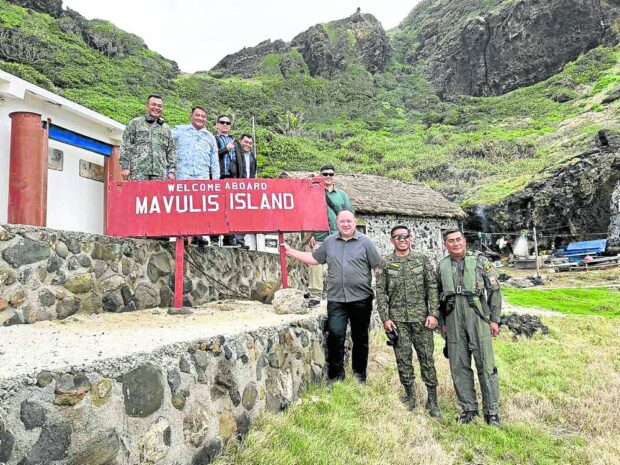
ON GUARD UP NORTH Defense Secretary Gilberto Teodoro Jr., Armed Forces of the Philippines chief Gen. Romeo Brawner Jr. and other military officials visit Batanes on Feb. 6 to inspect the military facilities in the province. Batanes Gov. Marilou Cayco joined the military officials during their visit. —Naval Forces Northern Luzon PHOTO
Defense Secretary Gilberto Teodoro Jr. wants increased military presence in Batanes, the northernmost Philippine province and the nearest to Taiwan, in the face of growing maritime tensions between Manila and Beijing in the South China Sea.
Teodoro, together with Armed Forces of the Philippines chief Romeo Brawner Jr. and other military officials, visited Batanes on Tuesday, particularly the naval detachment in Mavulis Island. Hosting them was Batanes Gov. Marilou Cayco.
The defense chief also inspected the ongoing construction of the Naval Forward Operating Base in Mahatao town in the main island of Batan.
“Starting 2024, the operational tempo for the AFP will be higher,” Teodoro said, as quoted in a statement issued Tuesday night by the Naval Forces Northern Luzon (NFNL).
Teodoro, according to the NFNL, also wanted the development of more military structures in Batanes, saying the province is “the spearhead of the Philippines as far as the northern baseline is concerned.”
The defense chief also gave instructions “for an increased AFP presence in the area,” it said, and for strengthened interagency cooperation between the military and other agencies, including the local government units, to protect Filipino fishermen.
‘Pivotal moment’
NFNL said Teodoro’s visit to Batanes signified “a pivotal moment in our nation’s commitment to territorial defense and national security.”
“The visit highlights the importance of fortifying our territorial defense capabilities to ensure the overall safety and integrity of our nation,” it said. In a separate statement on Tuesday night, the military’s Northern Luzon Command (Nolcom) said Teodoro’s visit to military facilities in Batanes was intended to “ensure the optimal functionality and readiness of these strategic sites crucial to the nation’s defense.”
Nolcom chief Lt. Gen. Fernyl Buca, who also joined Teodoro and Brawner during their visit, said the inspection “reinforces our commitment to maintaining defense facilities, ensuring our forces are prepared for any eventuality, and securing the sovereignty of our nation.”
In January this year, Buca visited Batanes and said the province could be a possible site for another “Balikatan” (shoulder-to-shoulder) exercises between Filipino and American troops. Last year, the province served as one of the training sites for these military drills.
Brawner thanked the troops deployed in Mavulis Island, which is 140 kilometers from Taiwan’s southern tip.
“What you’re doing here in Mavulis is essential to our territorial defense, in safeguarding our sovereignty, and in the performance of our mission as protector of the people and the state. I am very thankful to all of you,” he said.
‘Buffer zone’
Security analyst Chester Cabalza, president and founder of the Manila-based think tank International Development and Security Cooperation, explained the importance of Batanes in the country’s territorial defense. “Batanes completes the strategic importance of shielding the northern corridor for territorial defense as it can become a buffer zone in case of conflict, given its closeness to Taiwan,” Cabalza told the Inquirer on Wednesday.
Batanes’ peace-loving people and natural beauty should be protected, he said, for the island province “is surrounded by difficult navigational maritime domain and challenged by geopolitical dilemma, as it is situated in the middle of hotly contested Taiwan and controversial Cagayan province due to its two existing Edca sites.”
Edca refers to the Enhanced Defense Cooperation Agreement, the 2014 accord that allows American troops to be rotated for extended stays in the country and allows the United States to build and operate facilities in Philippine bases for US and Philippine use.
READ: DND to secure PH sovereignty, says Teodoro on Mindanao independence push
The Camilo Osias Naval Base in Sta. Ana town and Lal-lo Airport in Lal-lo town in Cagayan have been identified as additional Edca sites.
“Founding new military bunkers and naval detachments in Batanes are necessary to achieve a strong deterrence in protecting the national sovereignty of the Philippines,” Cabalza said.